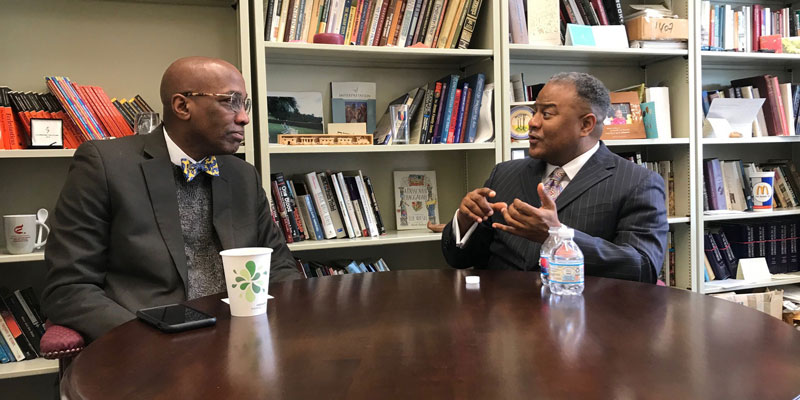
The Rev. Dr. J. Herbert Nelson, II, Stated Clerk of the General Assembly, hosted the Rev. Dr. Rodney S. Sadler Jr. of Union Presbyterian Seminary's Charlotte campus, during "Coffee with the Clerk" Monday. —Photo by Randy Hobson
People working Monday through Friday find they can squeeze in just enough time over the weekend for a part-time seminary education.
That’s the niche that Union Presbyterian Seminary’s Charlotte, N.C., campus is filling with a draw of up to 200 miles, the Rev. Dr. Rodney S. Sadler Jr. told the Rev. Dr. J. Herbert Nelson, II, Stated Clerk of the General Assembly, during the “Coffee with the Clerk” Facebook Live event broadcast from Sadler’s office Monday.
“It’s a new expression for one of the oldest seminaries in the South,” Sadler said of the Charlotte campus, which opened in 2002 and is home to about 80 students. “We realized there were so many Presbyterians in the area with no seminary to serve them. Why not bring a campus here and see what it brings about?”
In addition to the busy students, Sadler told Nelson, the faculty is active outside of the campus, which the seminary leases leased from its neighbor, Sharon Presbyterian Church.
“You can predict that on any given Sunday or Wednesday night, we are teaching and preaching somewhere,” said Sadler, an associate professor of Bible.
Part-time theological education is a growing trend, Nelson noted, because people with work commitments Monday through Friday appreciate a seminary that opens at 5:30 Friday evening and remains open and vibrant all weekend.
“People come to seminary not only to work in parish ministry,” he said, “but to connect more deeply with their church.”
Such accomplished leaders as the Rev. Frank Clark Spencer, president of the Board of Pensions, matriculated through Union Presbyterian Seminary’s Charlotte campus.
“He finished in 3 ½ or four years,” Sadler recalled of the man who previously was president and CEO of Habitat for Humanity of Charlotte. “We are proud of the people who have come through.”
The Rev. Dr. Katie Geneva Cannon, who founded the Center for Womanist Leadership at Union Presbyterian Seminary at nearly the same time Sadler was building the Center for Social Justice and Reconciliation, was “dedicated to making a better world for all of us, a world Christ would have us make,” Sadler said of Cannon, who died in August 2018. He said that he and she “worked together to frame a different sense of what Christianity could be.” The seminary community “is forever changed by her presence, and the church is forever changed” by “this young woman from a good Presbyterian family.”
She connected with people where they were at, both Nelson and Sadler said. Sadler said he recalls Cannon, one of the PC(USA)’s foremost theologians, involved in a lengthy conversation about NASCAR with the father of a colleague.
Nelson, who directed the Office of Public Witness before being elected Stated Clerk in 2016, also spoke with Sadler about the professor’s longtime involvement in Charlotte’s political and racial struggles.
Sadler, who’s done antiracism training for years, called racism “ungodly and un-Christian.” He said he, the Rev. William Barber II and others soon discovered that in every fight – rallying against the state Legislature’s denial of Medicaid expansion and for LGBTQ and voting rights, to name just a few examples – “the enemy was always the same. Why not work together to overcome the juggernaut?”
“The way things were going,” he said, “is the antithesis of what God says it should be like.”
The Church, Sadler said, has long been a voice for social change.
“I was raised with the idea that this is what faith is about,” he said. In the Lord’s Prayer we ask that God’s will be done on Earth as it is in heaven. “We don’t wait for the sweet by-and-by,” Sadler said.
Barber, he noted, has written that the Church has moved away from working for justice, “and it’s time to recognize we can’t cede that responsibility,” Sadler said. “We are at a pivotal place in our history. The denomination has to step up and say, ‘How do we continue to bear witness to Christ and to love our enemies as ourselves?’”
“It’s foolish to think we can sit on the sidelines,” Sadler added. “The world has questions that need to be answered.”
“The struggle for justice and humanity is a mission right at our doorstep,” Nelson said near the end of the hour-long discussion. “This,” he said, referring to seminary education, “is where the training ground begins, where our pastors make it happen.”
